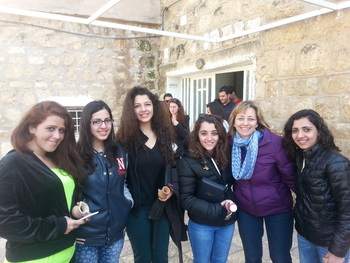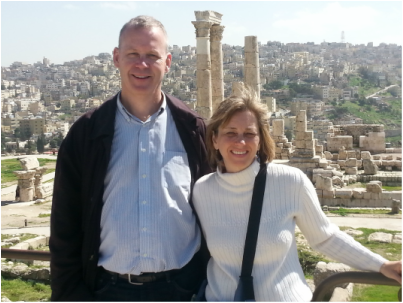 Five Quotes That Sum up My Experience of Jordan “Don’t worry…we don’t understand what we’re saying half the time, either!” “Wow, Arabic is an even more difficult language than I’d thought!” (Smiling slyly) “Oh, yes.” One of my new student friends and I had this exchange after I’d been standing for a while with a group of students who were engaged in a lively debate. (Many have excellent English and they often switched into it to welcome me.) I’m pretty sure she was kidding, but it was a sweet way to include me, and a great example of Jordanian humor. We’ve rarely been among students who have laughed so much together. “My parents named me ______! It’s not even a Jordanian name! I googled it and it means Feeding Chicken in Persian. What were they thinking?” This young man lamented his name as he introduced himself to me. Many of the students proudly shared that their names have meanings like Light, Beauty, Joy, and Strength. I doubt his parents had hens in mind when they named him, but in a country where names matter a lot, his was a bit of a disappointment, to him most of all. It didn’t seem to be stopping him from dreaming big dreams for his future and going for it with an entrepreneurial zeal that marked so many of the students we met. “Oh, you are from the United States! I went there a few years ago with our Track and Field national team while in high school. Everyone asked if we lived in tents and rode around on camels.” Ouch, this one made me wince. Amman is a very modern city, and in fact quite a car-oriented culture. The royal family has created an Automobile Museum which tells the story of their family and country through some of the cars and motorcycles they have driven over the past eighty or so years. The irony today of course is that while only a few Bedouins in Southern Jordan still live in tents, thousands of Syrian refugees are now living here in them, enduring a particularly cold winter, as this article describes. “I feel like a unicorn every time he says that here—like he’s saying I’m an animal everyone agrees does not exist.” “Yes, but we see you right here in front of us, and now we know that you do exist, and we are interested. We want to know more. Tell us how you were called into ministry.” The first line here was me (Lisa), after Rich had made a point of saying that his wife is an ordained minister. He has done all the teaching in the student ministry and churches here in Jordan, where women are very rarely in any church leadership roles beyond ministry to children and other women. I’ve appreciated how often he has wanted to work that into the conversation, but I never know how it will be received, given that it simply isn’t part of the church culture here. I suspect that many at the church think that I am simply in error or disobedience. So it was refreshing at the student conference to have students ask questions like the young woman here did. It made me feel that I was serving as a witness to what is possible for the women here, even though I did not formally teach or preach.  “We are living the book of Acts. We have prayed as a church to be used by God and to see miracles, and today we are seeing them over and over. It is such an exciting time for our church, even in the midst of tragedy.” The man who translated for Rich at church tonight shared this. He was referring to the ways God has blessed their church as they have reached out to the Iraqi refugees who have been fleeing ISIS in the past several months. Their church has more than tripled in size, as many of the refugees are at least nominally Christian and have been eagerly attending the multiple new Bible studies they have started to accommodate them. These refugees are mostly not in camps; they often come with some resources as they have been business people in Iraq. So they are living in simple apartments in the neighborhood around the church. But they have lost so much. One man who’s begun worshipping here lost his wife and daughter to ISIS plunderers of his town. The Iraqis are not allowed to work here in their current status, so finances are very tight. The church sends teams out to visit them, pray with them, and bring bags of groceries, etc. Church members are being transformed by this ministry, and refugees are coming to a deeper faith than they had known at home. So, as you read about ISIS and the ugliness and tragedy they bring, know that while it is tragic, it is not the only story here: God is powerfully at work to bring good out of evil.
1 Comment
mikegabelman
3/11/2015 09:37:03 am
Really appreciated this Lisa, thanks. And I'm encouraged to hear about the church's response to the Iraqi refugees.
Reply
Leave a Reply. |
Archives
April 2024
AuthorRich and Lisa Lamb Categories |
 RSS Feed
RSS Feed